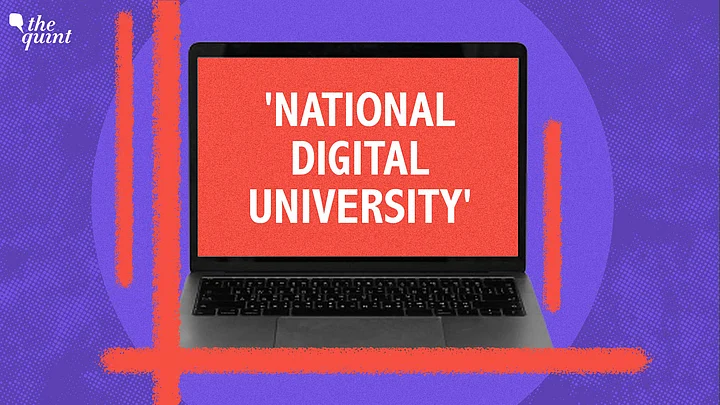The Chairman of University Grants Commission (UGC), Mamidala Jagadesh Kumar recently revealed the framework of how India’s first National Digital University (NDU), as envisioned under the National Education Policy (NEP) 2020, will work.
The digital university will allow students to pursue multiple courses from its different partner institutes.
As the name suggests, NDU will offer only online programmes.
Kumar mentioned NDU while discussing the operationalisation of recently introduced Academic Bank of Credit (ABC) with the vice-chancellors and faculty members of central universities.
The ABC will hold the academic data of all students, which can be used by students to transfer from one institute to another.
But how will this university work? How many students will be able to apply? When will the university begin its operations? Here is all you need to know.
How will the NDU work?
As a part of the new initiative, NDU will allow students to register for multiple courses from different institutes.
They will also be allowed to accumulate multiple credits from different institutes and redeem those credits to get a certificate, diploma, or a degree.
However, the ability given to the student to choose multiple courses from different institutes, and eventually design their own programme is "worrisome" for some professors.
"When you look at the universities abroad, all they boast about is their curriculum. That is what they have designed for their students and that is what provides their degree with some value. But when you give the liberty to student to design their own degree, how is any university supposed to take responsibility of such a degree," said Abha Dev Habib, Associate Professor at Delhi University.
The digital content of the course will be hosted by Study Webs of Active-Learning for Young Aspiring Minds (SWAYAM) portal of the government, while the technological and administrative services will be provided through government’s Samarth portal. This platform allows Higher Education Institutions (HEIs) to deploy a digital framework for planning, management, delivery and monitoring of services for students, staff and other stakeholders.
On online degree programmes, Habib said that "a university promotes association of students. Association of students with their peers and their professors. When people from heterogeneous communities come to universities, they don’t only get education but also meet people and sometimes find role models. How are students supposed to get all of this experience?"
How will the degrees be awarded?
Students will be required to accumulate at least 50 percent of total degree credits from one institute, in order to get a degree from that institute.
For example, if you opt for an online course from Banaras Hindu University (BHU) and earn 50 percent of the credits from BHU, then you will be awarded a degree by BHU.
“Students earning 50 percent credits of a programme from a single university will get the degree from that university. But one category of students are those who will do multiple credits from different institutions.
In those cases, the NDU will award them degrees,” UGC Chairman Mamidala Jagadesh Kumar said, as quoted by The Telegraph.
“After the NDU is established, students need not register for a degree. They can register for courses and accumulate credits. Once they reach a threshold, they can get the degree,” he added.
When will NDU begin its operations?
The NDU is expected to start its operations from next academic year i.e 2023-24. However, a detailed timeline of its establishment is yet to be revealed.
How many students can be a part of a programme offered under the NDU?
In an answer in Lok Sabha in July 2022, the Ministry of Education stated that there will be unlimited seats for every subject, preparing the youth for the current and future needs of learning and re-learning.
According to the government, NDU will address the problem of shortage of seats in educational institutions in India.
However, Habib believes that unlimited number of seats will impact the quality of education.
“Teachers-student ratio is very important for the quality of education. But all these courses are open and there can be a number of students. It will have a huge impact on the quality of education being imparted. Moreover, they are not hiring more faculties, and all of this is being done to cut the expenditure on education in India,” she said.
Which kind of programmes will be offered by the NDU?
The NDU will offer certificate programmes and diplomas, starting next academic session, and will eventually offer degree programmes.
Which other universities will partner with NDU?
Partners institutes of NDU are yet to be revealed by UGC. However, as per a report by News18 from October 2022, four universities were shortlisted to become the hub/partner for NDU.
These include Indian Institute of Technology (IIT) Madras, Delhi University (DU), Banaras Hindu University (BHU), and Indira Gandhi National Open University (IGNOU).
Finance Minister Nirmala Sithraman spoke about 'supplementary teaching methods' like PM eVidya and NDU, while presenting the Union budget 2022-23.
The digital university, she said, will provide access of education to all students.
Focusing on 'universalisation of quality education,' she said, "due to pandemic-induced closure of schools, our children, particularly in the rural areas, and those from Scheduled Castes and Scheduled Tribes, have lost almost two years of formal education. Mostly, these children go to government schools. We recognise the need to impart supplementary teaching and build a recipient mechanism for education delivery."
However, as per 'India Inequality Report 2022' , published by Oxfam India:
"Only 4 percent of the students from ST and 4 percent of the students from SC have access to Computer with internet facility. On the other hand, As high as 7 percent of the students from OBCs and 21 per cent of the students From “others” caste group have computer with Internet facility."
(At The Quint, we question everything. Play an active role in shaping our journalism by becoming a member today.)
